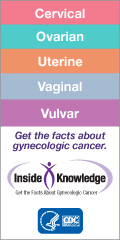Inside Knowledge Campaign

The Inside Knowledge: Get the Facts About Gynecologic Cancer campaign raises awareness of the five main types of gynecologic cancer: cervical, ovarian, uterine, vaginal, and vulvar. It encourages women to pay attention to their bodies and know what is normal for them, so they can recognize the warning signs of gynecologic cancers and seek medical care. When gynecologic cancers are found early, treatment is most effective.

"Be Brave. Ask Questions."
The newest Inside Knowledge public service announcements (PSAs) feature Jenny Allen, a mother, writer, and performer. She has performed her one-woman play, "I Got Sick Then I Got Better" in New York City and many other cities around the country. In the Inside Knowledge television, print, and radio PSAs, Ms. Allen encourages women to see a doctor if they have symptoms that are not normal for them and last two weeks or longer. She movingly tells her personal story of how she noticed symptoms, learned she had both uterine and ovarian cancers, and received treatment. She tells women, "Be brave. Ask questions. Chances are you don't have cancer, but find out for sure."
You can also go behind the scenes at the filming of the campaign's PSAs for a special CDC Web exclusive with Jenny Allen.

New Campaign Materials
Inside Knowledge has created a suite of materialsmaterials in English and Spanish for patients and health care providers. Fact sheets, a symptoms diary, [PDF-503KB] and posters on the five most common gynecologic cancers can be viewed, printed, and ordered online.
TelevisionTelevision and radioradio PSAs can be viewed and heard online; transcripts are available.
The newest materials from Inside Knowledge include a Symptoms Diary Wallet Card [PDF-830KB] that allows women to track symptoms, even when they are on the go, and a comprehensive brochure [PDF-2.9MB] that includes detailed information about each of the gynecologic cancers and discusses signs, symptoms, risk factors, diagnosis, and treatment.
Personal Survivor Stories
Each year in the United States, about 71,500 women are diagnosed with a gynecologic cancer. Recent estimates from the National Cancer Institute show that about 1.1 million American women were alive with a history of gynecologic cancer as of January 1, 2007.
Data source: Altekruse SF, Kosary CL, Krapcho M, Neyman N, Aminou R, Waldron W, Ruhl J, Howlader N, Tatalovich Z, Cho H, Mariotto A, Eisner MP, Lewis DR, Cronin K, Chen HS, Feuer EJ, Stinchcomb DG, Edwards BK (eds). SEER Cancer Statistics Review, 1975–2007, National Cancer Institute. Bethesda, MD, http://seer.cancer.gov/csr/1975_2007/, based on November 2009 SEER data submission, posted to the SEER Web site, 2010.
A new Inside Knowledge Web site featureWeb site feature focuses on women who have survived gynecologic cancer. Four women share their personal experience of being diagnosed with and treated for gynecologic cancers. Each has important advice for other women.
Read about—
- Debbie, an ovarian cancer survivor.
- Eileen, a cervical and uterine cancer survivor.
- Geraldine, a cervical cancer survivor.
- Tamika, a cervical cancer survivor.
Campaign Research
CDC has conducted extensive research as part of its Inside Knowledge campaign development, including—
- Analysis of existing educational materials and messages that identified gaps in information and assessed the need for new specialized materials.
- Analysis of data from Porter Novelli's HealthStyles and DocStyles surveys, from which CDC commissioned questions in 2008 and 2009 to gather baseline information on women's and health care providers' knowledge, attitudes, and practices related to gynecologic cancer.
- Formative research, message and concept testing using focus groups conducted in 2009 across the U.S. to learn more about women's knowledge, attitudes, and beliefs about gynecologic cancers, and to identify creative approaches and strategies to ensure campaign materials deliver intended messages in the most effective ways.
In addition, CDC convened a meeting of gynecologic cancer experts to exchange information on public health messaging and strategies to raise awareness among women about gynecologic cancer. Feedback from this meeting provided CDC with a general framework for the Inside Knowledge campaign.
Related Publications and Presentations
Campaign research and related activities have generated these scientific manuscripts and presentations—
Publications
- Cooper CP, Polonec L, Stewart SL, Gelb CA. Gynaecologic cancer symptom awareness, concern and care seeking among US women: a multi-site qualitative study. Family Practice 2012.
- Cooper CP, Gelb CA, Rim SH, Hawkins NA, Rodriguez JL, Polonec L. Physicians who use social media and other Internet-based communication technologies. Journal of the American Medical Informatics Association 2012.
- Baldwin LM, Trivers KF, Matthews B, Andrilla CH, Miller JW, Berry DL, Lishner DM, Goff BA. Vignette-based study of ovarian cancer screening: do U.S. physicians report adhering to evidence-based recommendations? Annals of Internal Medicine 2012;156(3):182–194.
- Saraiya M, Rosser JI, Cooper CP. Cancers that U.S. physicians believe the HPV vaccine prevents: findings from a physician survey, 2009. Journal of Women's Health 2012;21(2):111–117.
- Trivers KF, Rodriguez JL, Hawkins NA, Cooper CP, Polonec L, Gelb CA. Intention to seek care for symptoms associated with gynecologic cancers, HealthStyles survey, 2008. Preventing Chronic Disease 2011;8(6):A144.
- Stormo AR, Hawkins NA, Cooper CP, Saraiya M. The pelvic examination as a screening tool: practices of U.S. physicians. Archives of Internal Medicine 2011;171(22):2053–2054.
- Rim SH, Polonec L, Stewart SL, Gelb CA. A national initiative for women and health care providers: CDC's Inside Knowledge: Get the Facts About Gynecologic Cancer Campaign. Journal of Women's Health 2011;20(11):1579–1585.
- Stewart SL, Rim SH, Gelb CA. Physician knowledge and awareness of CA-125 as a screen for ovarian cancer in the asymptomatic, average-risk population. Health Education and Behavior 2011;39(1):57–66.
- Hawkins NA, Cooper CP, Saraiya M, Gelb CA, Polonec L. Why the Pap test? Awareness and use of the Pap test among women in the United States. Journal of Women's Health 2011;20(4):511–515.
- Cooper CP, Polonec L, Gelb CA. Women's knowledge and awareness of gynecologic cancer: a multisite qualitative study in the United States. Journal of Women's Health 2011;20(4):517–524.
Presentations
- Cooper CP, Gelb CA, Polonec L, Chu J, Wayman J, Grella L. Care seeking for gynecologic cancer symptoms. [PDF-2.3MB] Poster presented at the Women's Health Congress, Washington, DC, March 2012.
- Gelb CA, Polonec L, Chu J, Wayman J, Grella L. Common beliefs and misconceptions about gynecologic cancer: a qualitative study of U.S. women. [PDF-2.9MB] Poster presented at the Women's Health Congress, Washington, DC, March 2012.
- Gelb CA, Polonec L, Chu J, Wayman J, Mui S, Grella L. A woman-to-woman approach to increasing knowledge about gynecologic cancer: CDC's Inside Knowledge campaign.Poster presented at the National Conference on Health Communication, Marketing, and Media, Atlanta, GA, August 2011.
- Stormo AR, Hawkins N, Cooper C, Saraiya M. Pelvic examinations as a population-based screening tool for gynecologic cancers: Physicians' beliefs and clinical practices. Poster presented at the Women's Health Congress, Washington, DC, March 2011.
- Stewart SL, Rim SH, Gelb CA. Public and provider awareness of a CA-125 test as a screen for ovarian cancer. [PDF-123KB] Poster presented at the American Academy for Cancer Research's Frontiers in Cancer Prevention Research Conference, Houston, TX, December 2009.
Campaign Messages
The central messages of Inside Knowledge are—
- There are several types of gynecologic cancer.
- When gynecologic cancers are found early, treatment is most effective.
- Pay attention to your body and know what is normal for you. Gynecologic cancers have warning signs.
- If you have vaginal bleeding that is unusual for you because of when it occurs or how heavy it is, see a doctor right away.
- If you notice any other unexplained signs or symptoms that last for two weeks or longer, see a doctor.
- Get a Pap test regularly to screen for cervical cancer.
- Get the HPV vaccine, if you are 11–26 years old.
- If you are diagnosed with a gynecologic cancer, see a gynecologic oncologist—a doctor who is trained to treat cancers of the female reproductive system.
About the Campaign
Inside Knowledge supports the Gynecologic Cancer Education and Awareness Act of 2005, or Johanna's Law. [PDF-49KB] The law is named for Johanna Silver Gordon, who died of ovarian cancer in 2000. Johanna's sister, Sheryl Silver, originated the legislation in 2002 and, with the support of numerous nonprofit organizations, helped ensure its passage. The campaign's target audiences include women and health professionals. Learn more about the development of Inside Knowledge. [PDF-1.1MB] You can also see the campaign's major highlights, milestones, and activities [PDF-2.1MB] accomplished in 2011.
Support and Resources
Additional resources are available related to the five main gynecologic cancers, cervical, ovarian, uterine, vaginal and vulvar, including links to general information, patient support services, and research and provider organizations.
Search CDC's scientific articles on gynecologic cancers.
Contact Us:
- Centers for Disease Control and Prevention
Division of Cancer Prevention and Control
4770 Buford Hwy NE
MS K-64
Atlanta, GA 30341 - 800-CDC-INFO
(800-232-4636)
TTY: (888) 232-6348 - cdcinfo@cdc.gov



